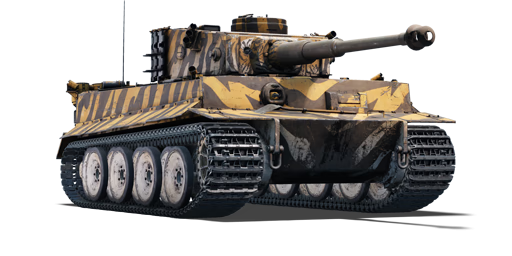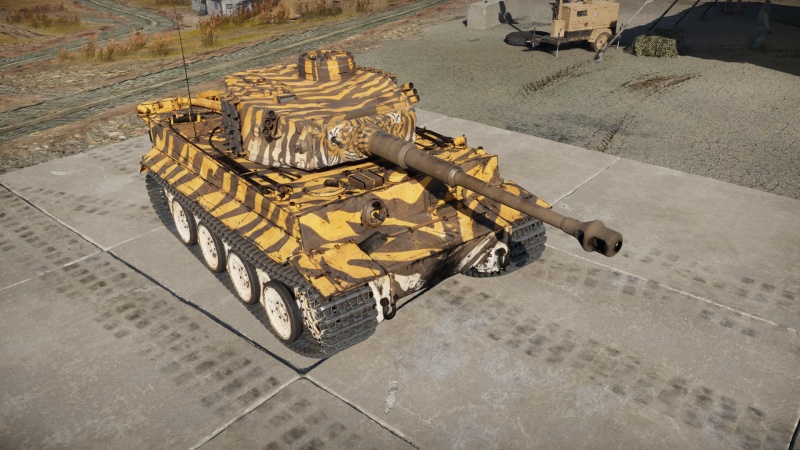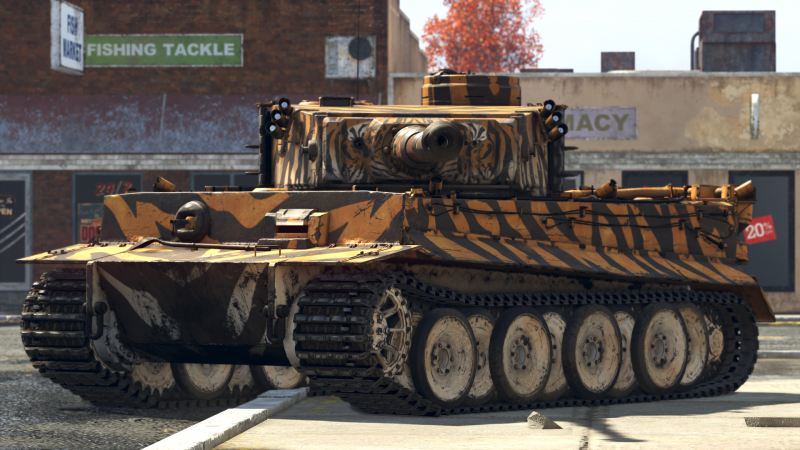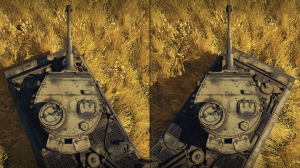Tiger (Germany)
| This page is about the German heavy tank Tiger (Germany). For other versions, see Tiger I (Family). |
Contents
Description
The ␠Tiger (Sd.Kfz. Index: Sd.Kfz. 181) is a premium gift rank III German heavy tank with a battle rating of 5.7 (AB/RB/SB). It was introduced in Update 1.77 "Advancing Storm" as a reward vehicle for the 2018 "Flying Serpent, Crouching Tiger" crafting event.
The Tiger is a famous heavy tank made by the Germans during WWII. It first saw combat in North Africa during 1942 against both American and British tanks like the M3 Lee. The Tiger is most commonly known for its blocky structure and 88-millimetre cannon. Used until the end of the war, it was fantastic in regards to its front armour, but had weaker armour on its sides and back.
This Tiger, often referred to as the "furry Tiger," is a Tiger H1 with a special orange, white and black Tiger stripe camouflage. It is considered a premium tank and as such comes with higher boosters, 30 free repairs and modifications unlocked.
General info
Survivability and armour
Armour type:
- Rolled homogeneous armour
- Cast homogeneous armour (Gun mantlet, Cupola)
| Armour | Front (Slope angle) | Sides | Rear (Slope angle) | Roof |
|---|---|---|---|---|
| Hull | 102 mm (9°) Front plate 62 mm (80°) Front glacis 102 mm (25°) Lower glacis |
82 mm Top 62 mm Bottom |
82 mm (9°) | 26 mm |
| Turret | 100 mm Turret front 90 - 200 mm Gun mantlet |
82 mm | 82 mm | 26 mm |
| Armour | Sides | Roof | ||
| Cupola | 80 mm | 26 mm |
Notes:
- Turret front covered by gun mantlet has variable thickness depending on exact place, ranging from 90 to 200 mm of armour.
- Turret side (about 1/3) is covered by attached tracks, adding additional 30 mm of armour.
- While the hull side of the tank is 82 mm, the side where the suspension is located is only 62 mm thick so be aware of this weak point.
- On paper, the best angle is roughly 38.8° with armour all-round being from the front 130 mm.
One may feel the need to charge head-on into battle, blaring that 88 mm gun as shells bounce off the front armour while the Schachtellaufwerk suspension system runs over the ground; this is a short-lived strategy.
The Tiger I should be played more like a bulky medium tank rather than a heavy tank despite its status, supporting allies from the sideline or from a distance rather than leading directly from the front. This is due to the poor armour arrangement with its "boxy" features, providing no sloping benefits alone. One must remain a distance, exploit the 88 mm long-distance power, and maintain a diamond-shape compound angling to maximize armour thickness against the trailing enemy shells that will inevitably come towards the Tiger's way.
Mobility
| Game Mode | Max Speed (km/h) | Weight (tons) | Engine power (horsepower) | Power-to-weight ratio (hp/ton) | |||
|---|---|---|---|---|---|---|---|
| Forward | Reverse | Stock | Upgraded | Stock | Upgraded | ||
| Arcade | 48 | 9 | 57.3 | 839 | 1,240 | 14.64 | 21.64 |
| Realistic | 45 | 9 | 575 | 650 | 10.03 | 11.34 | |
Modifications and economy
Armaments
Main armament
| 88 mm KwK36 | Turret rotation speed (°/s) | Reloading rate (seconds) | |||||||||||
|---|---|---|---|---|---|---|---|---|---|---|---|---|---|
| Mode | Capacity | Vertical | Horizontal | Stabilizer | Stock | Upgraded | Full | Expert | Aced | Stock | Full | Expert | Aced |
| Arcade | 92 | -8°/+16° | ±180° | N/A | 9.7 | 13.4 | 16.3 | 18.0 | 19.2 | 9.62 | 8.51 | 7.84 | 7.40 |
| Realistic | 7.1 | 8.4 | 10.2 | 11.3 | 12.0 | ||||||||
Ammunition
- PzGr 39 - The go-to shell for all Tiger H1 drivers as this is arguably the best. It will do incredible damage to any tank shot by it, except SPAA, or any extremely thin armoured vehicles. Heavier tanks like the IS-1, IS-2, or American heavy tanks are able to resist the round at longer ranges, but well-placed shots from close range or sides will do the job. All other medium and light tanks will be history as soon as this shell make contact with them. This shell, however, will almost always over-penetrate all but the most armoured SPAA vehicles, so it is best to use HE or machine gun fire on thin-skinned vehicles.
- Pzgr. - This shell is also very useful. It has very similar characteristics as PzGr 39, but sacrifices some penetration for about 50% more Explosive Filler, meaning even more damage than already powerful PzGr 39. It is recommended to carry some of these shells and use them regularly, as the penetration is still enough to deal with most targets (at least when being down-tiered), and switch to PzGr 39 when shooting targets far away, or those that are heavily armoured.
- Hl.Gr 39 - On paper the HEAT rounds don't bring anything new to the table, however they can be used as a substitute for the HE shells due to the greater explosive mass and still gives a fighting chance if caught with pants down.
- Sprgr. L/4.5 - The HE shell is completely ineffective against all but SPAA or the AI artillery on the Kursk and Ash River maps, and the machine gun mounted on the Tiger has proven quite capable of dealing with these. Keep a small supply of this shell on hand if planning to flank the enemy and take out their SPAA or artillery, but avoid them for everything else.
| Penetration statistics | |||||||
|---|---|---|---|---|---|---|---|
| Ammunition | Type of warhead |
Penetration @ 0° Angle of Attack (mm) | |||||
| 10 m | 100 m | 500 m | 1,000 m | 1,500 m | 2,000 m | ||
| PzGr 39 | APCBC | 165 | 162 | 151 | 139 | 127 | 117 |
| Pzgr. | APCBC | 153 | 151 | 140 | 128 | 116 | 106 |
| Hl.Gr 39 | HEAT | 110 | 110 | 110 | 110 | 110 | 110 |
| Sprgr. L/4.5 | HE | 18 | 18 | 17 | 15 | 14 | 13 |
| Shell details | ||||||||||||
|---|---|---|---|---|---|---|---|---|---|---|---|---|
| Ammunition | Type of warhead |
Velocity (m/s) |
Projectile mass (kg) |
Fuse delay (m) |
Fuse sensitivity (mm) |
Explosive mass (TNT equivalent) (g) |
Ricochet | |||||
| 0% | 50% | 100% | ||||||||||
| PzGr 39 | APCBC | 773 | 10.2 | 1.2 | 14 | 108.8 | 48° | 63° | 71° | |||
| Pzgr. | APCBC | 810 | 9.5 | 1.2 | 14 | 215.04 | 48° | 63° | 71° | |||
| Hl.Gr 39 | HEAT | 600 | 7.64 | 0 | 0.3 | 1,100 | 62° | 69° | 73° | |||
| Sprgr. L/4.5 | HE | 820 | 9 | 0.2 | 0.1 | 900 | 79° | 80° | 81° | |||
Ammo racks
| Full ammo |
1st rack empty |
2nd rack empty |
3rd rack empty |
4th rack empty |
5th rack empty |
6th rack empty |
7th rack empty |
8th rack empty |
9th rack empty |
10th rack empty |
Visual discrepancy |
|---|---|---|---|---|---|---|---|---|---|---|---|
| 92 | 76 (+16) | 60 (+32) | 44 (+48) | 28 (+64) | 24 (+68) | 20 (+72) | 16 (+76) | 12 (+80) | 6 (+86) | 0 (+92) | No |
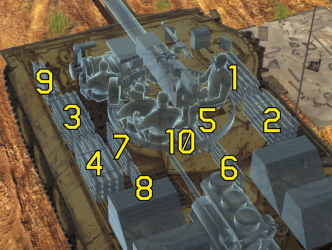
Note:
- Large sides empty: 28 (+64) shells.
Machine guns
| 7.92 mm MG34 | ||||
|---|---|---|---|---|
| Mount | Capacity (Belt) | Fire rate | Vertical | Horizontal |
| Coaxial | 4,350 (150) | 900 | - | - |
Usage in battles
The main role of the Tiger tank was to eliminate enemy tanks at a far range, similar to behaving like a sniping tank, or a Tank Destroyer. Nonetheless, the Tiger can excel at brawling with other tanks at medium, even possibly against two Panther tanks to close range and escape undamaged. It's recommended to not stay in one place for too long or risk getting outflanked, spotted, or bombed.
While guns like the Soviet 85 mm cannon can easily penetrate the Tiger at close range, the Tiger can stay nearly invulnerable at long range. The 88 can take out any tank on Rank 3 at any combat range but may have problems with the IS-1's 120 mm front armour at some ranges. When having to close in a bit, it is generally advisable to angle the hull to the sides by about 30°, improving the armour rating enough that it can keep away 85 mm shells very well, even at closer ranges. The Tiger is still vulnerable to the SU-152s howitzer and its HE shell at any range. So whenever encountering these heavy-calibre vehicles, it should be prioritized and eliminated first.
Mobility-wise the Tiger is pretty good for a heavy tank. It is much faster than a KV-1 and about as equally fast as the IS-1, although medium tanks like the T-34-85 can easily outmanoeuvre all three at close range. Try to use the Tiger's mobility to keep a distance rather than for closing in on a target. Don't be afraid to use the speed to fall back if necessary as the Tiger cannot survive close range engagements on open terrain vs. mediums, due to the slow turret and the vulnerability to the 85 mm guns on Soviet medium tanks.
The Tiger has a very bad turret traverse, it is recommended to get the Turret Drive traverse modification as fast as possible. Even then, the Tiger will have to turn the tank in the direction of the traverse to make the most of the time to quickly engage a target. This, together with very exposed ammo racks on both sides (though one side can be emptied by reducing the ammo stowage) means that facing multiple enemies at once is almost a certain end to the Tiger tank. The best option is to take cover from one tank and fire on the other.
As far as ammo is concerned, the default PzGr 39 will be the standard AP rounds many players will use. The second AP round available, the Pzgr., is also a good round to use against the enemy as the shell contains more explosive filler than the default, but suffers from a lower penetration value compared to the PzGr 39. The HEAT rounds offer consistent penetration at all ranges including more than 2,000 m. However, they provide less damage upon penetration. HEAT rounds usually are usually not used as the primary ammunition type for this sole reason. Upgrading the tank should mainly be dedicated to turret traverse, hull traverse (as this is needed even with the turret traverse upgrade) and engine upgrades. The Tiger's 88 has massive destructive power. Unlike the other German tank of its rank, all armed with 75 mm guns, the Tiger can easily one-shot all the mediums like the T-34s, M4 Shermans, and still be a threat against heavy tanks like the IS-1s. If it doesn't destroy a tank in one hit, most of the enemy crew will be wounded or incapacitated. The best place to aim with the 88 is either at the gunner's side of the enemy turret to incapacitate an enemy's firepower, or between the driver and the gunner which would usually wound or knock out most of the enemy crew at once. Attacking from the side also presents a good shot opportunity, as the best shot placement is right below the turret on the hull where most of the tank ammunition are stored, giving a big chance for an ammo-rack explosion.
When driving the Tiger, plan ahead on where it will drive. Even with engine and track modifications, the Tiger is still a heavy tank and a 90 degree or more turn will almost always mean an immediate standstill as the tank try to make the change in movement. Even small adjustments can knock the speed down a bit. Thus, knowing the terrain and destination is of the utmost importance to preserve its mobility to its fullest extent.
The Tiger is also best used on the flanks of the current maps, as these are usually more open and allow good use of its armour and excellent gun. The centre of the map would seem more logical as there are a lot of enemies, but as has already been established a Tiger taking fire from multiple directions won't last long. Going in a flank and taking down light and medium tanks is an easy task for this beast, and thus a flank can be easily secured if the Tiger is driven carefully. Then, work the Tiger into the enemy sides and rear of the main force in the centre, doing much more damage than if the Tiger faced the force head-on because a shot to the side and rear will set most enemies alight if not outright exploding the ammunition. Able to destroy vehicles in one hit, the Tiger can quickly jump from target to target and eliminate a good number of enemies in its lifespan.
There will be many hard eggs to crack such as the IS Series, T-34 Series, American Jumbos, and several other tanks that will give the Tiger I trouble.
- The Soviets have many tanks at the BR able to handle the Tiger H1 easily. The main tank at this BR is the T-34-85. While it may have very thin armour and is easy to penetrate it is easy to angle and the T-34 is a flanking machine, it will drive circles around the Tiger so it needs to be destroyed quickly. The IS Heavy tanks are the second worst nightmare situation. Thick armour and a huge gun. If the IS tank is not destroyed first, it will definitely destroy the Tiger.
- The American Jumbos are similar to the T-34. The 75 mm variant would have trouble to penetrate the Tiger's armour at long ranges, but caution needs to be exercised when they are armed with a 76 mm gun.
- The Japanese tanks all have very thin armour that the 88 mm gun can easily penetrate through with no problem, but their guns at this BR all have enough penetration to deal with the Tiger if it gets a hit on.
Pros and cons
Pros:
- Turret armour is particularly hard to penetrate, especially around the mantlet
- One of the fastest heavy tanks with its top speed of 45 km/h
- Good reverse speed
- It's box-like shape gives the ability to some angling tactics
- The rear is surprisingly hard to penetrate, partially due to the slightly-angled armour and partly due to the large exhaust pipes which seem to deflect shells
Cons:
- Has trouble dealing with other heavy tanks
- Only performs well against soft targets
- Lower glacis is easy to penetrate, therefore watch for one going over hills
- Transmission catches fire easily if struck
- Ammo racks offer great targets
- Slow acceleration and turning speed
- Turret traverse is second slowest on heavy tank line for Germany
- Low manoeuvrability, susceptible to being outflanked by more quicker adversaries
- Unsloped armour on all sides
- Armour is worthless unless angled
- Can meet against some tough opponents
- S-Mine dischargers on the hull limits gun depression in certain areas
History
This tank is the same tank as the Tiger H1, but has a very special camouflage, - a tiger camouflage. This tank could only be made during the Flying Serpent, Crouching Tiger event which spanned from 31 March to 3 April 2018.
Media
- Skins
- Videos
See also
Links to the articles on the War Thunder Wiki that you think will be useful for the reader, for example:
- reference to the series of the vehicles;
- links to approximate analogues of other nations and research trees.
External links
| Germany heavy tanks | |
|---|---|
| Tiger 1 (Henschel) | Tiger H1 · Tiger E · ␠Tiger |
| Tiger 1 (Porsche) | VK 45.01 (P) · Pz.Bef.Wg.VI P |
| Tiger 2 | Tiger II (P) · Tiger II (H) · Tiger II (H) Sla.16 · Tiger II (10.5 cm Kw.K) |
| Super heavy tanks | Maus · E-100 |
| Trophies | |
| Great Britain | ▀Pz.Kpfw. Churchill |
| USSR | ▀KV-IB · ▀KW I C 756 (r) · ▀KW II 754 (r) |
| Germany premium ground vehicles | |
|---|---|
| Light tanks | Pz.II C (DAK) · Pz.Sfl.Ic · Pz.Sp.Wg.P204(f) KwK · Sd.Kfz. 140/1 · Sd.Kfz.234/1 · Ru 251 · SPz 12-3 LGS · TAM 2IP |
| Medium tanks | Nb.Fz. · Pz.III N · Pz.Bef.Wg.IV J · ▀M4 748 (a) · ▀T 34 747 (r) · Ersatz M10 |
| mKPz M47 G · Turm III · Leopard A1A1 (L/44) · Leopard 2 (PzBtl 123) · Leopard 2A4M | |
| Heavy tanks | ▀Pz.Kpfw. Churchill · ▀KV-IB · ▀KW I C 756 (r) · ▀KW II 754 (r) |
| VK 45.01 (P) · ␠Tiger · Pz.Bef.Wg.VI P · Tiger II (H) Sla.16 | |
| Tank destroyers | Sd.Kfz.234/3 · Sd.Kfz.234/4 · Sd.Kfz.251/10 · Sd.Kfz.251/22 · 15 cm Pz.W.42 |
| Brummbär · Panzer IV/70(A) · VFW · Bfw. Jagdpanther G1 · Elefant · 38 cm Sturmmörser | |


